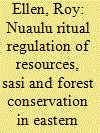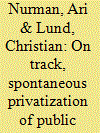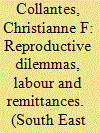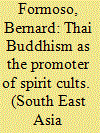|
|
|
Sort Order |
|
|
|
Items / Page
|
|
|
|
|
|
|
| Srl | Item |
| 1 |
ID:
144758


|
|
|
|
|
| Summary/Abstract |
The much studied 1999 big bang of Indonesian government decentralization was, in the end, relatively muted and quickly undone in forestry. This paper assesses the big bang as it relates to forestry. It reviews the extensive body of literature that was produced in the years immediately after the big bang occurred, as well as siting it in the longer sweep of Indonesian forestry history. The paper finds that there has been a long-term centralizing tendency in forestry governance, with nation-building and assertion of power over resources in the periphery being key centralizing forces. However, there are valid reasons for decentralized forestry management, such as improving rural development and respecting traditional rights through more accountable and responsive institutional arrangements. It is suggested here that a number of changing factors in Indonesia and in forestry could provide opportunities for a more enduring decentralization in forestry. These include strengthening democratic institutions, a declining role for natural forests in wood production as plantations replace supplies, and a shift to forms of governance built on systems thinking. For these reasons, it is suggested that the promises of decentralized forest governance might be delivered, not as a central government-ordained big bang, but rather as a progressive, paradigmatic evolution.
|
|
|
|
|
|
|
|
|
|
|
|
|
|
|
|
| 2 |
ID:
144764


|
|
|
|
|
| Summary/Abstract |
This article analyses the development of the governing mechanism in British Burma relating to one particular ethnic group, the Chinese, between the 1890s and 1920s. Recognizing its limited knowledge of China and the Chinese, British Burma relied in the early days on experiences from other colonies to govern its Chinese immigrants and to handle Sino-Burmese border issues. The transfer of colonial knowledge, however, proved insufficient when the state witnessed increasing localization at the turn of the twentieth century. Interlocutors and communal elites therefore replaced imperial expatriates to form the main governing body, and in turn to some extent undermined and reconstructed colonial knowledge, as well as practice.
|
|
|
|
|
|
|
|
|
|
|
|
|
|
|
|
| 3 |
ID:
144760


|
|
|
|
|
| Summary/Abstract |
Life in fishing communities is difficult in most countries in South East Asia. In the Philippines, where this study took place, income from fishing has become even more disastrously low in recent years, with more and more fishing grounds yielding less fish due to overexploitation and uncontrolled illegal fishing. In the fishing community considered in this paper, aside from diversifying sources of income, kinship ties provide a safety net in a rather different sense. People deploy kinship in a deliberately strategic way: they limit their everyday interactions with kin, choosing to be intimate only with a select few. The rationale behind this practice is clear: by choosing a select few with whom they have a reciprocal relationship when it comes to sharing goods and services, they are able to manage their resources well and survive tough economic times. Such a practice of 'forgetting kin', however, has implications for the community's conceptualization of the configurations of kinship, as well as its social cohesion and prospects for political activism, undermining the very economic survival it tries so hard to serve.
|
|
|
|
|
|
|
|
|
|
|
|
|
|
|
|
| 4 |
ID:
144757


|
|
|
|
|
| Summary/Abstract |
Nuaulu (Seram, Maluku, Indonesia) manage forest to provision sacred house building and ritual feasting through a system of protected areas (sin wesie), examined here in relation to sasi institutions and scare charms (matakau) that overlap in their functions. Sasi feature in wider debates about how customary practices might deliver conservation objectives. The paper analyses interconnections between these three forms of regulation in the context of deforestation, social change and the recent history of state management interventions.
|
|
|
|
|
|
|
|
|
|
|
|
|
|
|
|
| 5 |
ID:
144759


|
|
|
|
|
| Summary/Abstract |
The history of land control in Indonesia is overwhelmingly one of colonial conquest, government enclosure and expropriation of traditional property rights. However, beneath these great transformations, counter-currents also flow. Encroachment on state land and its gradual privatization by ordinary people sometimes gnaw at government property. Through a series of small, sometimes innocuous actions, people manage to undo the previous ownership regime. This article shows how settlers over a period of some 30 years – through a strategic mixture of civic disobedience and civic compliance – managed to appropriate, formalize and effectively privatize land belonging to the stateowned railway company in the city of Bandung. The authors argue that disobedient occupation and subsequent obedient payment of taxes, documentation of residence and 'normalization' of the area have reduced the company's ownership to thin formality, whereas new residents hold all the substantial elements of property rights to the land.
|
|
|
|
|
|
|
|
|
|
|
|
|
|
|
|
| 6 |
ID:
144762


|
|
|
|
|
| Summary/Abstract |
The recent influx of Shan migrants from Myanmar into the city of Chiang Mai, Thailand, provides the conditions for migrant public spheres to emerge. This paper explores aspects of mass-mediated forms of Shan migrant public spheres by focusing on two Shan-language radio stations, one state-run and the other a community station. While much of the literature on public spheres emphasizes the role of the media in allowing citizens to express and publish opinions, it largely excludes those who are marginal to the mainstream public sphere, such as transnational migrant populations. This paper therefore investigates the operations of two Shan-language radio programmes, the community they serve and the effects they have on that community. The paper argues for a need to re-conceptualize the notion of 'the public' as communities of interest, and to expand the notion of the public sphere to include non-citizen space.
|
|
|
|
|
|
|
|
|
|
|
|
|
|
|
|
| 7 |
ID:
144761


|
|
|
|
|
| Summary/Abstract |
This paper explores the reproductive dilemmas of individuals from a communal compound in Cavite, which are impacted by the complicated intersection of economic globalization and prescriptions of gendered performances and spatialities. Specifically, it looks at how remittances from overseas Filipino worker (OFW) relatives and the personal desires for overseas mobility directly shape these individuals' decisions regarding reproduction, relationships and intimacies. Wilson's (2004) concept of intimate economies helps to frame and theoretically encase the ongoing dialogue between global labour economies and personal intimacies related to reproduction and family planning. Ethnographic data and narratives were collected while the Philippines' Reproductive Health Law (commonly known as the RH Law) was being passed in December 2012. As it mandates public access to reproductive health services including artificial contraceptives, sex education and maternal care, the RH Law continues to face strong opposition from leaders of the Philippine Catholic Church and formidable 'Anti-RH' movements (approximately 81% of Filipinos identify themselves as Roman Catholic). This article highlights how reproductive dilemmas are dictated not only by religious beliefs and practices, but also by gendered and economic arrangements against a backdrop that is both politically polemical and rapidly globalizing.
|
|
|
|
|
|
|
|
|
|
|
|
|
|
|
|
| 8 |
ID:
144763


|
|
|
|
|
| Summary/Abstract |
Studies of religion in Buddhist societies of South East Asia have largely overlooked the role played by Buddhism in the growth of spirit cults. Through a comparison of Thai Buddhist and Tai pre-Buddhist conceptions of death and the afterlife, this paper shows how the theory of karmic causation introduced uncertainty about the status of rebirth and failed to erase previous conceptions about the afterlife. As a result, the belief in reincarnation coexists with the idea that the soul of the deceased may maintain an active presence among the living. Buddhism also imposed a redemption-cum-protection transactional pattern with spirits and deities, whose gradations of meaning are interpreted with reference to different variables. This pattern extends to supernatural patron–client bonds, a typical feature of the Thai social structure.
|
|
|
|
|
|
|
|
|
|
|
|
|
|
|
|
|
|
|
|
|